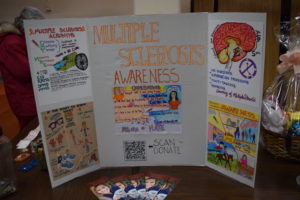When AnnaMarie Prono was 27, she woke up one morning feeling like her left hand had fallen asleep.
She brushed it off and went on a week-long cruise in the Caribbean, only to experience more sensations of numbness and pins and needles throughout other parts of her body.
A spinal tap confirmed that Prono had multiple sclerosis, a disease in which the immune system eats away at the protective covering of nerves.
 “I saw a general neurologist who specialized in epilepsy at the time, and he told me, ‘Yes, you have multiple sclerosis. You should get a cane and stay out of the heat,’” Prono said.
“I saw a general neurologist who specialized in epilepsy at the time, and he told me, ‘Yes, you have multiple sclerosis. You should get a cane and stay out of the heat,’” Prono said.
“He just sent me on my way,” she continued. “I was like, ‘How can this be?’”
When she was first diagnosed, Prono felt discouraged when her doctor told her that there’s no cure for MS, and because it’s so rare, pharmaceutical companies did not want to spend substantial funds to research the disease.
She was prescribed steroids to calm the flare ups, and informed that the FDA would approve three new injectable treatments to slow the progression of MS.
“I was very shy of starting any of that because this was all new, and I didn’t know the long term effects and what it would do to me,” she said.
“I wondered when I would get another flare up. When will I have all my feeling back in my hand, and when are my eyes going to be normal again so I can drive? I was told to wait and see,” she continued.
Two years after her first episode, Prono experienced another where she was completely numb from the waist down, her pupils jumped up and down and she had vertigo.
This instance prompted her to try different treatments to help prevent intense episodes from recurring.
However, when she got tired, her symptoms would flare up, which was a common occurrence from her high stress job as an architect and construction manager.
“I remember I was working on a project where we looked at a statue. Normally, I would just jump or climb up anything to look, and for the first time I said I was afraid to do it because I didn’t trust that I wasn’t going to fall,” Prono said.
“My new neurologist at NYU told me I have secondary progressive MS, which was devastating,” she continued. “I didn’t like the fact that I couldn’t work anymore, and I thought my life was over.”
 Prono has participated in various studies with NYU, which included transcranial direct stimulation—a service that is not yet FDA approved—but has shown great success for her.
Prono has participated in various studies with NYU, which included transcranial direct stimulation—a service that is not yet FDA approved—but has shown great success for her.
This year, Prono celebrates 30 years of living with MS, and with that, 30 years of leading the AMTeam in WalkMS.
Upon signing up for her first walk, Prono said it is something she will continue to do as long as she is able to walk.
“I think I’ve raised $240,000 over the last 30 years with my team. Friends and family have been amazingly supportive,” she said. “Because this is the 30th year, and I never thought that I’d get to 30 years, I decided I needed to do something special to raise money and awareness.”
On the weekend of Palm Sunday, Prono held an art showing at Our Lady of Mercy in Forest Hills, where she displayed her original artworks and sold prints to raise money for National MSSociety.
Over the course of the pandemic, she worked on a personal art series called “100 Days of Birds.” From hummingbirds to peacocks, she used colored pencils to explore drawing a different bird each day.
After reaching 100, she went on to draw insects and other animals, as well as numerous religious figures.
“I would tell people that during the pandemic, the one hour I spent drawing was probably the best hour of my day,” Prono said.
“This year, I took part in an art therapy study with the University of Florida, and I’m currently enrolled in an art therapy program with NYU Langone,” she continued. “That has been very eye opening for me.”
Prono also participates in equine therapy at GallopNYC Forest Hills, and recently wrote a musical about Mother Cabrini and a little girl that had MS.
Although she’s now quite open about her journey with MS, Prono said that wasn’t always the case.
“Thirty years ago, I was afraid to tell people. I was afraid about losing my job,” she said. “Now, I talk to people about it openly, and I’ll just come out and say it.”
“Now, 30 years after my diagnosis when there were no approved treatments for MS, we have 16 different disease modifying therapies that are approved by the FDA,” she continued. “If you don’t get the answer you want, keep looking.”




